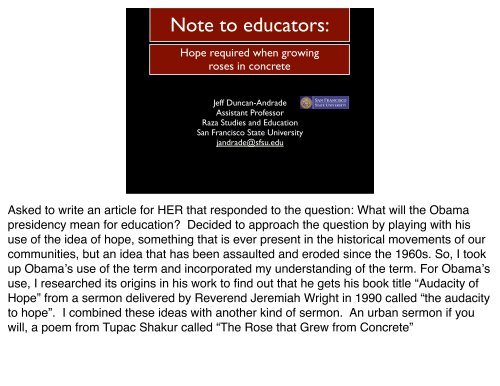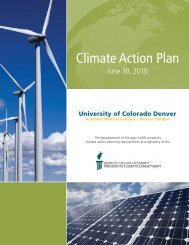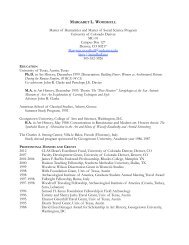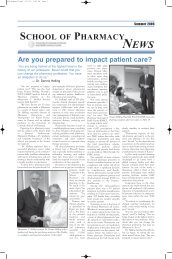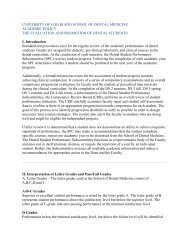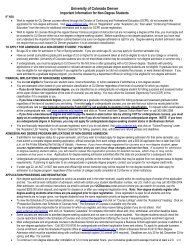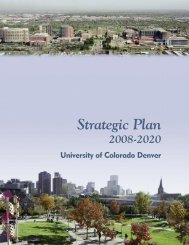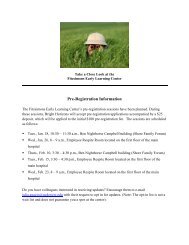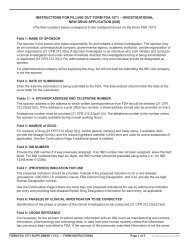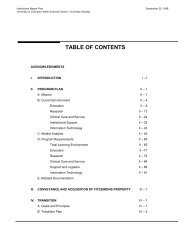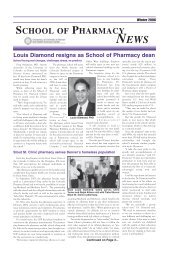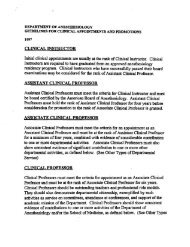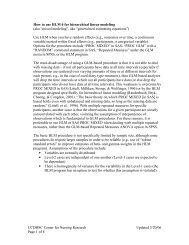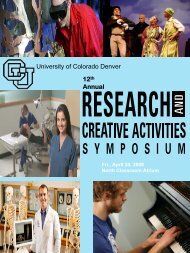Note to educators - University of Colorado Denver
Note to educators - University of Colorado Denver
Note to educators - University of Colorado Denver
You also want an ePaper? Increase the reach of your titles
YUMPU automatically turns print PDFs into web optimized ePapers that Google loves.
<strong>Note</strong> <strong>to</strong> educa<strong>to</strong>rs:<br />
Hope required when growing<br />
roses in concrete<br />
Jeff Duncan-Andrade<br />
Assistant Pr<strong>of</strong>essor<br />
Raza Studies and Education<br />
San Francisco State <strong>University</strong><br />
jandrade@sfsu.edu<br />
Asked <strong>to</strong> write an article for HER that responded <strong>to</strong> the question: What will the Obama<br />
presidency mean for education? Decided <strong>to</strong> approach the question by playing with his<br />
use <strong>of</strong> the idea <strong>of</strong> hope, something that is ever present in the his<strong>to</strong>rical movements <strong>of</strong> our<br />
communities, but an idea that has been assaulted and eroded since the 1960s. So, I <strong>to</strong>ok<br />
up Obama!s use <strong>of</strong> the term and incorporated my understanding <strong>of</strong> the term. For Obama!s<br />
use, I researched its origins in his work <strong>to</strong> find out that he gets his book title “Audacity <strong>of</strong><br />
Hope” from a sermon delivered by Reverend Jeremiah Wright in 1990 called “the audacity<br />
<strong>to</strong> hope”. I combined these ideas with another kind <strong>of</strong> sermon. An urban sermon if you<br />
will, a poem from Tupac Shakur called “The Rose that Grew from Concrete”
The rose that grew<br />
from concrete<br />
To You ask see us you why wouldn’t Don’t ask<br />
we turn from ask my why why.<br />
On the contrary. We bad the would <strong>to</strong> worse<br />
rose<br />
We And that would is these grew <strong>to</strong> all ignore Well, This are from love we Thank my is from its the the are damaged will which concrete. God. the <strong>to</strong> reach roses. we pedals. had came. the sun.<br />
all celebrate its tenacity.<br />
damaged Ask me, petalss. how?<br />
You see you<br />
wouldn’t ask why<br />
the rose that grew<br />
from the concrete<br />
had damaged pedals.<br />
After: As I see it, this is exactly what we are trying <strong>to</strong> do in our work.<br />
We are trying <strong>to</strong> grow roses in the concrete, in spite <strong>of</strong> the fact that<br />
concrete <strong>of</strong>fers perhaps the worst possible conditions in which <strong>to</strong> grow.<br />
It is devoid <strong>of</strong> light, water, and other key nutrients. It is <strong>to</strong>xic.
“This is the concrete...”<br />
• Physical violence/PTSD (Carrion, 2009)<br />
•<br />
1/3 <strong>of</strong> urban youth display symp<strong>to</strong>ms <strong>of</strong> PTSD,<br />
twice that <strong>of</strong> soldiers returning from Iraq<br />
(Tucker, 2007)<br />
• Racism (Jones, 2000; Williams, 1995)<br />
• Patriarchy (Geronimus, 2006)<br />
•<br />
• Institutional violence (Akom, 2008)<br />
•<br />
•<br />
Gentrification/root shock (Fullilove, 2004)<br />
Poverty in the face <strong>of</strong> great wealth (CNR, 2008)<br />
Educational & eco-apartheid (Akom, 2009)<br />
Let me say a little more about this metaphor <strong>of</strong> concrete b/c I don’t<br />
want you <strong>to</strong> get twisted up on some Ruby Payne “framework <strong>of</strong> poverty”<br />
thinking that I am describing some kind <strong>of</strong> social deviance on the part<br />
<strong>of</strong> our communities. One <strong>of</strong> the major gaps in our field is that teachers<br />
are rarely given all <strong>of</strong> the information that they need <strong>to</strong> be successful.<br />
This does not mean it isn’t out there, you’ve just got <strong>to</strong> go and find it<br />
b/c they aint gonna bring it <strong>to</strong> you. Well, <strong>to</strong>day I’m gonna give you a<br />
piece. A HUGE piece. At least it was for me. Nothing has impacted my<br />
teaching more than...
...and these are my damaged pedals”--Tupac Shakur
The impact <strong>of</strong> “damaged pedals”<br />
on health and well-being<br />
• Increases “allostatic load” (McEwen &<br />
Seeman, 1999)<br />
• Accumulation <strong>of</strong> multiple negative<br />
stressors without the resources <strong>to</strong> cope<br />
(CNR, 2004)<br />
• Induces the process <strong>of</strong><br />
“weathering” (Geronimus, 2006)<br />
McEwen & Seeman, 1999<br />
Allostatic load refers <strong>to</strong> the “cumulative negative effects, or the price the<br />
body pays for being forced <strong>to</strong> adapt <strong>to</strong> various psychosocial challenges and<br />
adverse environments”
WTF?!?<br />
We’re screwed!<br />
We cannot end these things so we’re screwed! Not true. This same<br />
research indicates that in outlier cases, there were key agents <strong>of</strong> HOPE<br />
that intervened <strong>to</strong> create greater sense <strong>of</strong> control over the social<br />
stressors. We ARE the solution. What we do IS literally life & death. We<br />
CANNOT get it wrong. All our data indicates that how we respond, en<br />
masse, as educa<strong>to</strong>rs has the greatest impact on life trajec<strong>to</strong>ry.
• In the dictionary<br />
•<br />
Hope is our hope:<br />
What is hope?<br />
defined as both a noun and a verb--“a feeling <strong>of</strong><br />
expectation and desire for a certain thing <strong>to</strong><br />
happen”<br />
• In the research<br />
•<br />
•<br />
•<br />
Psychology: Hope theory (Snyder, 2002)<br />
Social epidemiology: sense <strong>of</strong> “control <strong>of</strong><br />
destiny” (Wilson, 2008; Syme, 2004)<br />
In mythology<br />
• the last thing <strong>to</strong> emerge from Pandora’s box
All ‘hope’ aint good hope:<br />
Pandora’s Box & optimism vs. hope<br />
• Beware the false hopes <strong>of</strong> unfounded<br />
optimism<br />
• Hokey hope<br />
• Mythical hope<br />
• Hope deferred
False Hope<br />
Hokey hope<br />
Mythical hope<br />
Hope deferred<br />
Critical Hope<br />
Material hope<br />
Socratic hope<br />
Audacious hope<br />
Hokey hope<br />
• “The tranquilizing drug <strong>of</strong> gradualism”<br />
• Individualistic up-by-your-bootstraps<br />
hyperbole<br />
• Valenzuela’s (1999) “aesthetic care”<br />
• Delegitimizes the pain that urban youth<br />
experience<br />
• Rooted in the optimism <strong>of</strong> the specta<strong>to</strong>r who<br />
needs not suffer<br />
• Fundamental incomprehension <strong>of</strong> suffering
Mythical hope<br />
False Hope<br />
Hokey hope<br />
Mythical hope<br />
Hope deferred<br />
Critical Hope<br />
Material hope<br />
Socratic hope<br />
Audacious hope<br />
• Obama’s election--“hope on a<br />
tightrope”? (West, 2008)<br />
• A-his<strong>to</strong>rical and depoliticized denial<br />
In reference <strong>to</strong> Teddy Roosevelt’s 1901 White<br />
House dinner invitation <strong>to</strong> Booker T.<br />
Washing<strong>to</strong>n: “America <strong>to</strong>day is a world away<br />
from the cruel and prideful bigotry <strong>of</strong> that time.<br />
There is no better evidence <strong>of</strong> this than the<br />
<strong>of</strong> suffering<br />
• Depends on luck and the law <strong>of</strong><br />
averages <strong>to</strong> produce individual<br />
exceptions <strong>to</strong> the tyranny <strong>of</strong> injustice<br />
election <strong>of</strong> an African American <strong>to</strong> the<br />
presidency <strong>of</strong> the United States. Let there be no<br />
reason now for any American <strong>to</strong> fail <strong>to</strong> cherish<br />
their citizenship in this, the greatest nation on<br />
Earth”.--McCain’s concession speech
False Hope<br />
Hokey hope<br />
Mythical hope<br />
Deferred hope<br />
Critical Hope<br />
Material hope<br />
Socratic hope<br />
Audacious hope<br />
Hope deferred<br />
• Based on a progressive politics <strong>of</strong><br />
despair<br />
• Avoids “blaming the victim” and turns instead <strong>to</strong> blaming<br />
“the system”<br />
•<br />
Critique <strong>of</strong> social inequality never manifests in<br />
transformative pedagogical project (Solórzano &<br />
Delgado-Bernal, 2001)<br />
• “Hope” for change in its most deferred<br />
forms<br />
• Some distant future reformed society<br />
•<br />
Individual student’s future ascent <strong>to</strong> the middle class
False Hope<br />
Hokey hope<br />
Mythical hope<br />
Hope deferred<br />
Critical Hope<br />
Material hope<br />
Socratic hope<br />
Audacious hope<br />
...still deferring<br />
• Individualistic in nature, requiring<br />
level <strong>of</strong> sacrifice most teachers are<br />
<strong>of</strong> Needs<br />
loath <strong>to</strong> make<br />
Self<br />
• Ignores the gap actualization b/w students’ most<br />
pressing needs and the education<br />
we<br />
Esteem<br />
we <strong>of</strong>fer <strong>of</strong>fer them them<br />
Love & belonging<br />
• Unwillingness and/or inability <strong>to</strong><br />
close gap = Physiological/Safety hope deferredneeds:<br />
Food, clothing, shelter, safety<br />
• Hope <strong>to</strong>o long deferred is hope<br />
Maslow, denied<br />
A. A. (1970). Motivation and Personality. New York: Harper & and Row. Row.<br />
Maslow’s Hierarchy
Moving from coping <strong>to</strong> hoping<br />
• Coping as resiliency<br />
• Building capacity <strong>to</strong> cope with social<br />
trauma<br />
• Hope as healing<br />
• Building capacity <strong>to</strong> respond <strong>to</strong><br />
social trauma
Critical hope:<br />
The enemy <strong>of</strong> hopelessness<br />
• Three types <strong>of</strong> critical hope<br />
• Material hope<br />
• Socratic hope<br />
• Audacious hope
False Hope<br />
Hokey hope<br />
Mythical hope<br />
Deferred hope<br />
Critical Hope<br />
Material hope<br />
Socratic hope<br />
Audacious hope<br />
Material hope<br />
• Good teaching as material resource<br />
•<br />
Rigorous pedagogy busting false binary b/w<br />
academic rigor and social justice (Duncan-<br />
Andrade & Morrell, 2008)<br />
•<br />
Show and prove! Transformational pedagogical<br />
project delivered (Hidalgo, 2009)<br />
• Material resources<br />
•<br />
$, food, rides, lap<strong>to</strong>ps, school supplies, housing,<br />
tu<strong>to</strong>ring, links <strong>to</strong> medical and legal services
False Hope<br />
Hokey hope<br />
Mythical hope<br />
Deferred hope<br />
Critical Hope<br />
Material hope<br />
Socratic hope<br />
Audacious hope<br />
Socratic hope<br />
• West’s “Socratic sensibility” (Duncan-Andrade, 2007)<br />
•<br />
Show the sermon, rather than preach it--are we on<br />
the painful path with them?<br />
• Do we make the self-sacrifices in our own lives that we are<br />
asking them <strong>to</strong> make?<br />
• Do we have the capacity and commitment <strong>to</strong> support<br />
students when they struggle <strong>to</strong> apply that framework in<br />
their lives?<br />
•<br />
Moving from empathy <strong>to</strong> solidarity earns the right <strong>to</strong><br />
demand<br />
• Liked OR loved? Love aint cheap! (Darder, 2002a/b)<br />
• All great undertakings are risky...-Socrates in The Republic
False Hope<br />
Hokey hope<br />
Mythical hope<br />
Deferred hope<br />
Critical Hope<br />
Material hope<br />
Socratic hope<br />
Audacious hope<br />
Audacious hope<br />
• Embraces “legitimate suffering” (Jung, 1970)<br />
•<br />
Not “other people’s children” (Delpit, 1995); their pain<br />
is our pain<br />
• Classroom as micro-ecosystem<br />
• A pedagogy that confronts (Akom, 2008) and “radically<br />
heals” (Ginwright, 2009) the suffering <strong>of</strong> our children<br />
• “Gardener’s Tale” (Jones, 2000)<br />
• “There are no weeds” (Yang, 2009)<br />
• Stares down the painful path and despite the<br />
cost makes the journey again and again
Critical hope is “radical healing”
We might not change the world...<br />
but we can spark the mind that does.<br />
Boudhanath Stupa (shrine)--one <strong>of</strong> the largest<br />
Buddhist<br />
shrines in the world-- near Kathmandu. Boudhananth is<br />
a spiritual<br />
center for Tibetan Buddhists in Nepal.
When roses stay in the<br />
concrete...<br />
they become rose gardens
To be or not <strong>to</strong> be?<br />
That is our question<br />
The question is not whether or not we can grow rose gardens in<br />
concrete, it is whether or not we will. Indeed, some 40+ years ago<br />
during a debate at Oxford, Malcolm drew from Shakespeare’s Hamlet<br />
<strong>to</strong> frame this very same challenge <strong>to</strong> us. A challenge <strong>to</strong> develop a<br />
movement for justice and freedom that would defy false borders <strong>of</strong><br />
nation-states, age, race, gender, and class. I am clear, that in this<br />
moment, he was speaking <strong>to</strong> all <strong>of</strong> us. So, since he says it better than<br />
me, I’ll let him close us out.
TO BE!<br />
There can be no<br />
other choice


